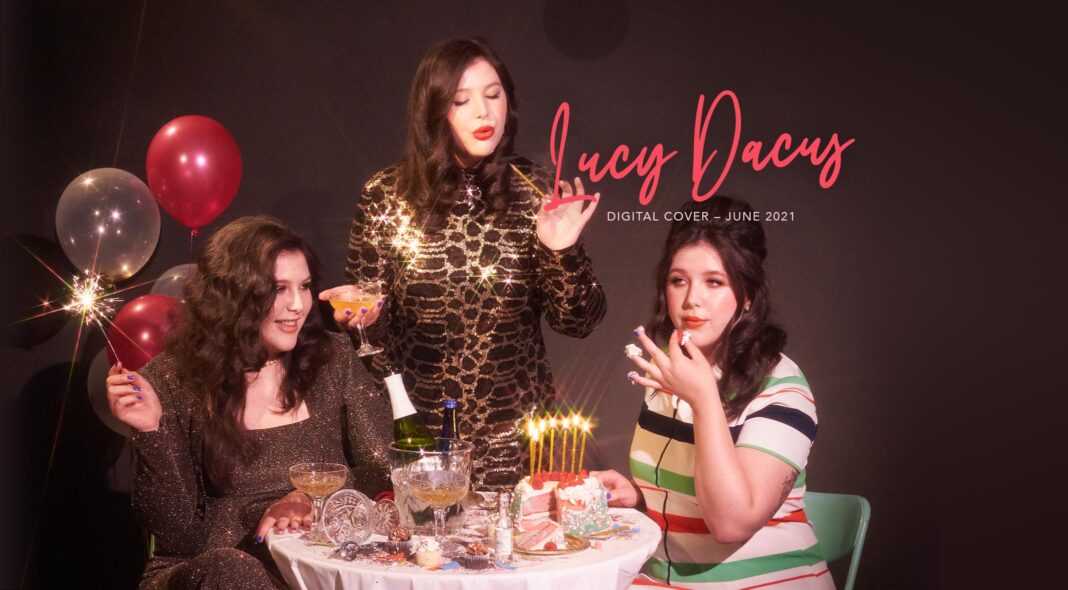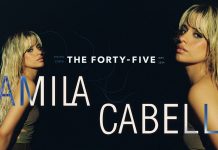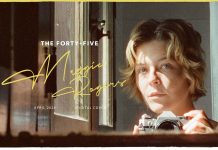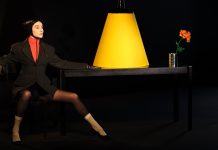
Lucy Dacus
To mark one year of The Forty-Five, Emma Holbrook had a slice of birthday cake with Lucy Dacus – solo artist and one-third of indie-rock supergroup boygenius – as she dusts off the VHS player for new album ‘Home Video‘.
Photos: Natalie Piserchio. Creative Direction: Emily Barker. Hair and Makeup: Abby Berni and Bryona Smith
“How did I get here when that was who I was?” Lucy Dacus asks, recalling a clip of her awkwardly playing violin at a fifth-grade Christmas concert. It’s rhetorical but you sense she’d like an answer.
When you watch videos from your childhood, who do you see? The person on the screen has the same name and face as you, but so much has happened to your shared body since. It takes an uncomfortable amount of vulnerability to look back – what did you choose to remember and what did you choose to forget? When Lucy Dacus looked back, she emerged with ‘Home Video’: a set of deeply intimate songs torn from the pages of her teenage journals. With the poetic specificity of a set of short stories, she crawls back through a dog door, snorts nutmeg at Bible Camp again and re-watches an old boyfriend do his best Brando impression from the street below. We don’t see how she got there and we don’t see where she heads to next, but even if these memories are taped over with a new context, it’s still Lucy.
“I feel like I’m always rewriting the past, whether I mean to or not,” Dacus says, while flanked on either side by a banjo and a Gibson Flying V guitar – caught between ‘three chords and the truth’ and fully-fledged rockstar status. The careful curation of stories has always been at the heart of what Dacus does: there were plenty of these moments on her blinder of a second record, aptly titled ‘Historian’, as well as her ‘2019’ EP that interspersed covers – Springsteen, Piaf, Wham! – with original songs. ‘Home Video’ holds her most vivid stories yet, with beautifully drawn characters and lyrics that are witty, electric and devastating. She knows her way around a killer burn, too – “I’m laughing ‘cause you think you’re Brando but you’ll never come close” – and isn’t embarrassed to get bratty when the situation calls for it: “You called me cerebral…would it have killed you to call me pretty instead?”
As easy as it would be to believe that this record of memories and reflection was a product of the pandemic, when ‘Home Video’ is released to everyone on June 25, it will be almost two years old: “The whole record was actually done and recorded before lockdown. Completely done. But I did double down in lockdown, looking into the past. I started typing up my old journals, starting at the top and reading which I had never done before. I like things that make me feel weird and the passage of time reliably makes me feel weird. So maybe there’s a chance that people will be able to relate now.”
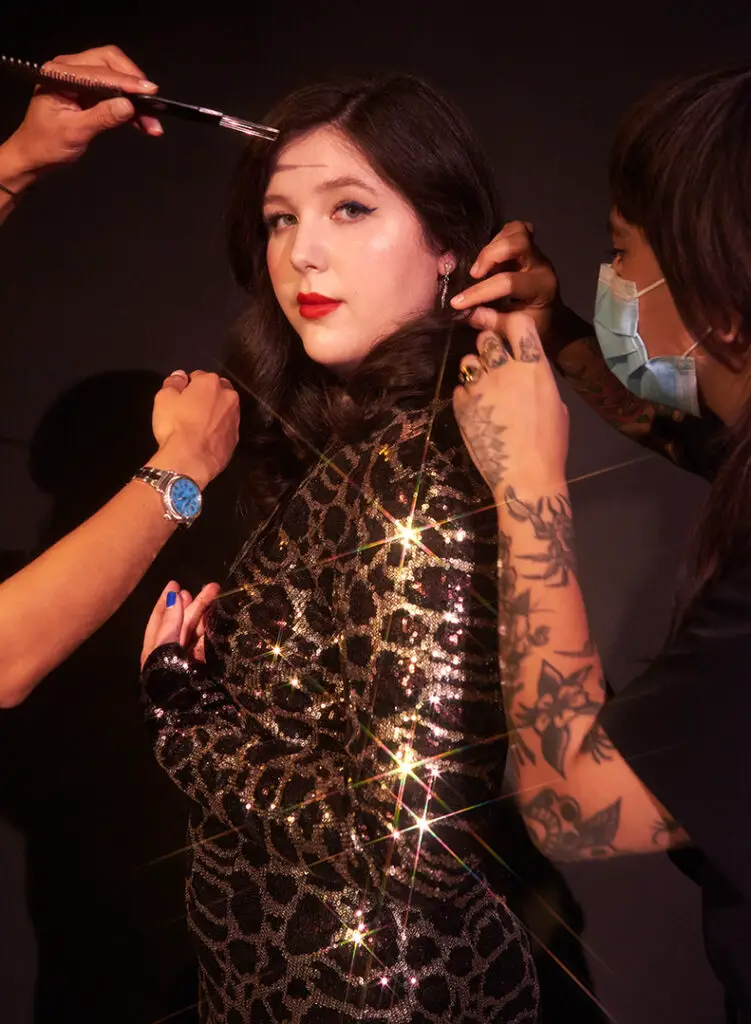
I like things that make me feel weird and the passage of time reliably makes me feel weird.
Lucy Dacus
She’s right to note a cultural appetite for revisiting the past to make sense of the future; a planet trying to hold onto muddled memories before they’re unceremoniously taped over. “I’ve been seeing a lot of people going back to the old detritus of their childhoods. That can be such a trippy experience,” she says. “Every time that you remember something, even neurologically, you’re kind of rewriting the memory. I heard somewhere that the people with the most pristine memories are people with dementia because they don’t actually recall the memories and technically, they’re the truest in their minds. I do a lot of remembering and I believe I get a lot of insight with distance but I also kind of wonder, ‘Am I getting farther from the truth by remembering so much?’”
The pursuit of truth did take her farther from home. Dacus is Zooming in from Philly, where she now lives after a lifetime spent in Richmond, Virginia. She didn’t get much opportunity to discover her new city before the global shutters came down, but she still appreciates the change of scenery: “Just being in a place where people haven’t known me since I was a little child is really nice. But I don’t know what it means: I haven’t really gotten to live here yet.” Things are beginning to change. Now they’re both fully vaccinated, Dacus’ mum paid her and Philadelphia a visit: “She wanted to run up the Art Museum steps like Rocky and we saw the Liberty Bell, but she was super disappointed that it’s a replica. She was like, ‘It’s just a damn bell!’”
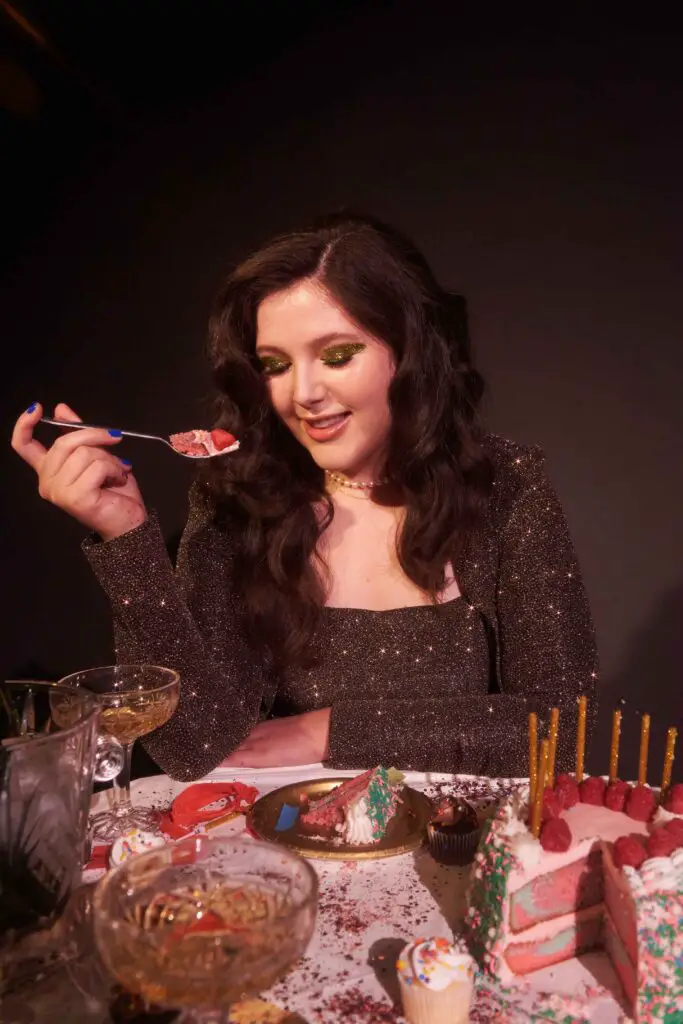
It was her mum who unearthed the family videos, perhaps to organise memories or perhaps for the same reason that other parents crave a reminder of when their grown-ups were still their kids: “She was like, ‘Oh, my God, you have to see this’ and pulled up all these embarrassing things. So, my work isn’t done…” Dacus had already chosen snippets for the ‘Hot & Heavy’ music video, which sees her figuratively and literally retracing her past by watching clips from her childhood in a cinema full of friends and family. She takes a bow at the curtain call, both embracing and outgrowing her younger self: “It’s bittersweet to see you again.“
“Part of why it’s hard to watch is because I can’t really identify who that is. I just got back into that frame of mind where I’m like, ‘I don’t know who I am or how to be someone that I like’, you know? And you feel less stable because right now, I like who I am and I like my life. It freaks me out a little bit.”
How could anyone carve out their own identity when someone else is deciding your path for you? Growing up in Richmond also meant growing up under the suffocating shelter of the Church. “When you’re a kid, they teach you about lovely things like forgiveness and patience and self control. Love, kindness and gratitude. I don’t regret that part of my upbringing.” It couldn’t stay that way forever. When she went to high school, “literally every single sermon was like ‘don’t have sex’,” so when Church shifted, so did she. The impact of those formative years is unambiguous now (“We’re coming home from a sermon / saying how bent on evil we are”), but for a while, her entire life was Church. Dacus doesn’t really believe in God anymore – “that’s the short answer”– but her belief “didn’t go from something to nothing. It went from something to something bigger.”
Did that faith double as a comfort blanket? “Oh my God, yeah,” Dacus says, irony not lost. “A comfort blanket and a crutch and an identity and a shell to inhabit and a community and a family and a reason. It was everything.”
“When I look back on my middle school self especially, I’m like, ‘Did she have a personality?’ I really think all she did was love God. I can’t relate to her anymore. At the time, I remember my whole goal was to be a body in God’s service… I actually wanted to be a husk for God’s will,” she can’t help but chuckle, the laugh of a now fully-realised human being. “I still sometimes feel like a baby because I didn’t spend those years trying to craft who I am because it was basically answered for me. So I feel behind some of my friends on my ‘ self-discovery’ journey, whatever that is.”
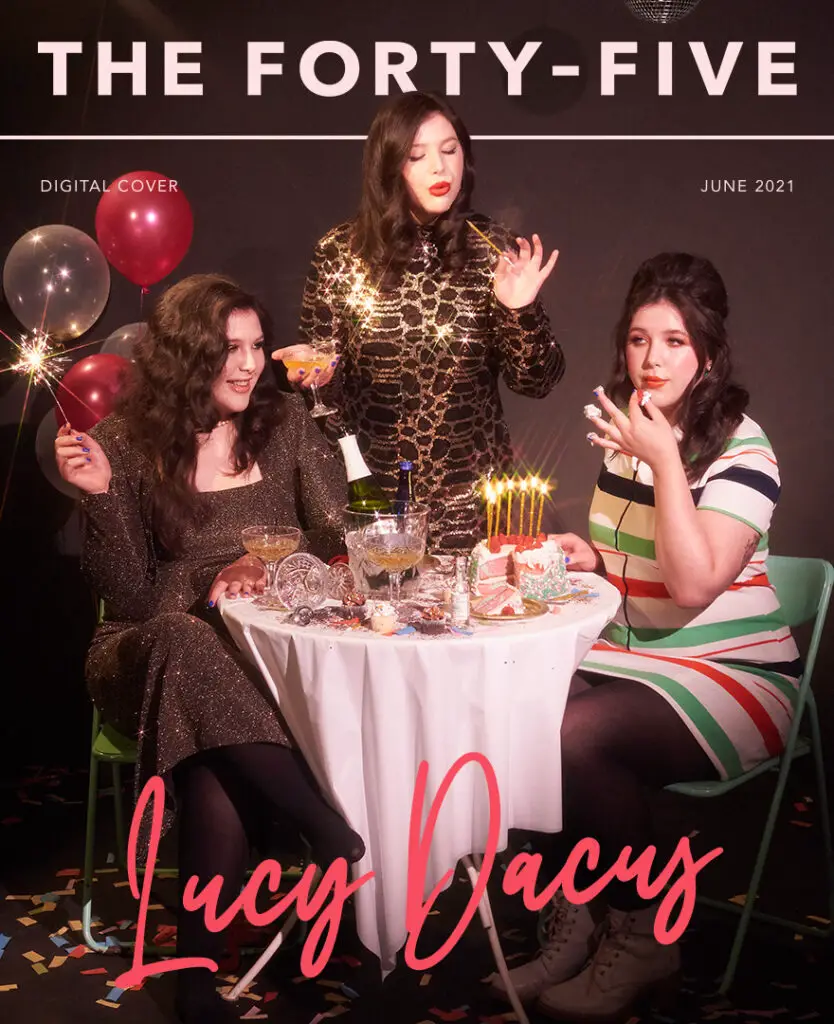
When I look back on my middle school self, I’m like ‘Did she have a personality? I really think all she did was love God.’
Lucy Dacus
It’s been years since Dacus decided to leave the Church but she still feels the aftershocks: “I have a good idea of who I am and then I realise incrementally, ‘Oh, wait, no, that was handed to me too!’ I feel like I’m always realising that I’ve been tricked into the person that I am,” she laughs again. “There’s a gradual undoing that’s bringing me closer to who I want to be.”
She has the hindsight to realise what she missed out on. The album’s closer ‘Triple Dog Dare’, which stretches out for a sublime and tender seven minutes 44 seconds, tells the story of young queer love that almost was: “How did they betray me? What did I do? / I never touched you how I wanted to.” Perhaps remembering the past can bring you closer to the truth, after all. “I didn’t even recognise it. I shifted around it, like, ‘Oh, she must be a role model. I must want to be like her.’ I would just say, ‘We’re best friends, so that means that we need to share everything and spend all this time together’… So there were ways that I kept myself from realising what was happening,” she observes with a wry smile.
The track isn’t overtly political (although Dacus, who performed at Bernie Sanders rallies and writes lyrics like “building our fears like bricks in a wall”, certainly never shies away from that) but her personal experience is a testament to the quieter side of Pride, how vital it is to unlearn shame. “It was really sad to realise how many experiences I kept myself from because of fear. Even if it didn’t feel like fear in the moment, I had just decided what things were allowed to happen and everything that didn’t fit into that, didn’t happen. I don’t necessarily regret it but I do wonder: what if I had been more curious or honest with myself?”
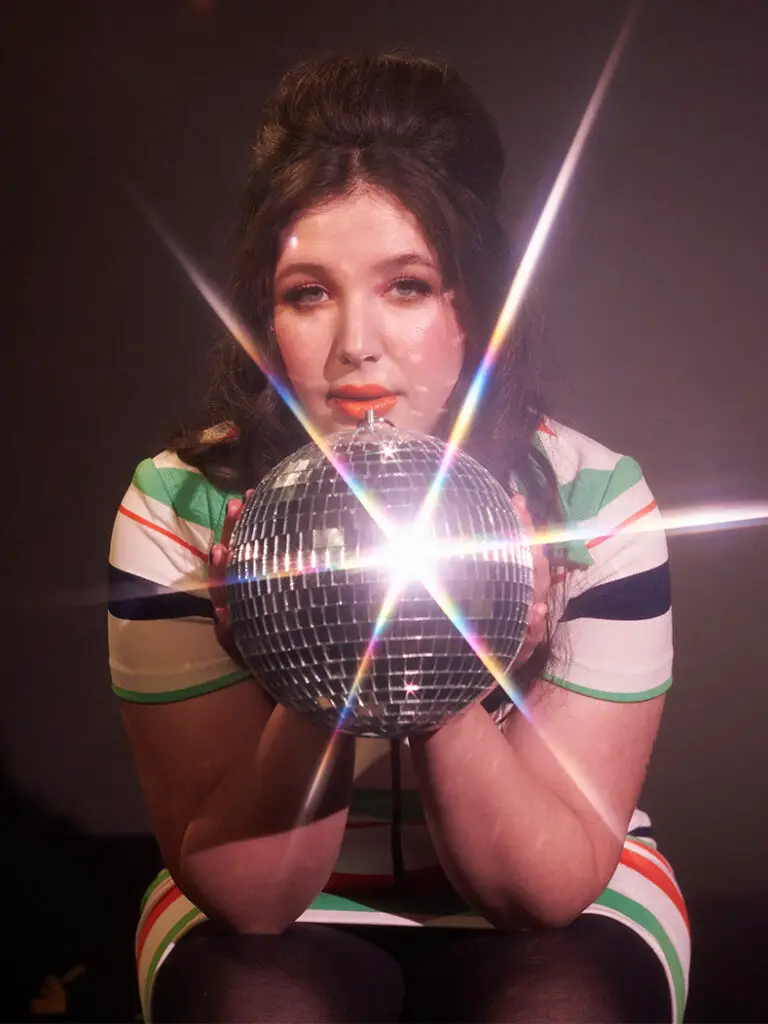
It was really sad to realise how many experiences I kept myself from because of fear. I do wonder: what if I had been more curious or honest with myself?
Lucy Dacus
As ‘Triple Dog Dare’ descends into a fantasy of teenage runaways, Dacus takes that ‘what might have been’ and runs with it, sharing the cinematic grandeur and apocalyptic sensibility of Phoebe Bridgers’ ‘I Know The End’. Bridgers is a dear friend, who appears in the background of ‘Home Video’, as does Julien Baker to complete the boygenius lineup – the indie supergroup with the best matching tattoos and custom suits in the game.
“People are always saying ‘get the band back together!’ but it’s like… we are together!” Dacus exclaims with faux indignance. “We might talk today – we FaceTime and have a group chat, and we send each other demos and ideas for our own work.”
“People are always saying ‘Get the band back together’ but it’s like, we are together!”
Lucy Dacus
Nashville in 2019 became a music camp for the trio, recording tracks for their respective albums in tandem, alongside a feature on Hayley Williams’ ‘Roses/Lotus/Violet/Iris’ – “We got a lot done!” ‘Going Going Gone’ is one of two ‘Home Video’ tracks that reunites boygenius, a folksy anthem and auction house of possibilities. Dacus’ vocals – warm and lovely – recall a young relationship as Baker and Bridgers chime in with harmonies, campfire-style, to lift her up. It ends with a behind-the-scenes snippet – “I am so happy… I owe y’all whatever you ask of me for the rest of my life” – that’s heartwarming to hear. “I think it’s just so obvious how enriched we are by each other. We all trust that it’s an equal playing field when we’re speaking. It’s the natural result of our friendship, that we make music together.”
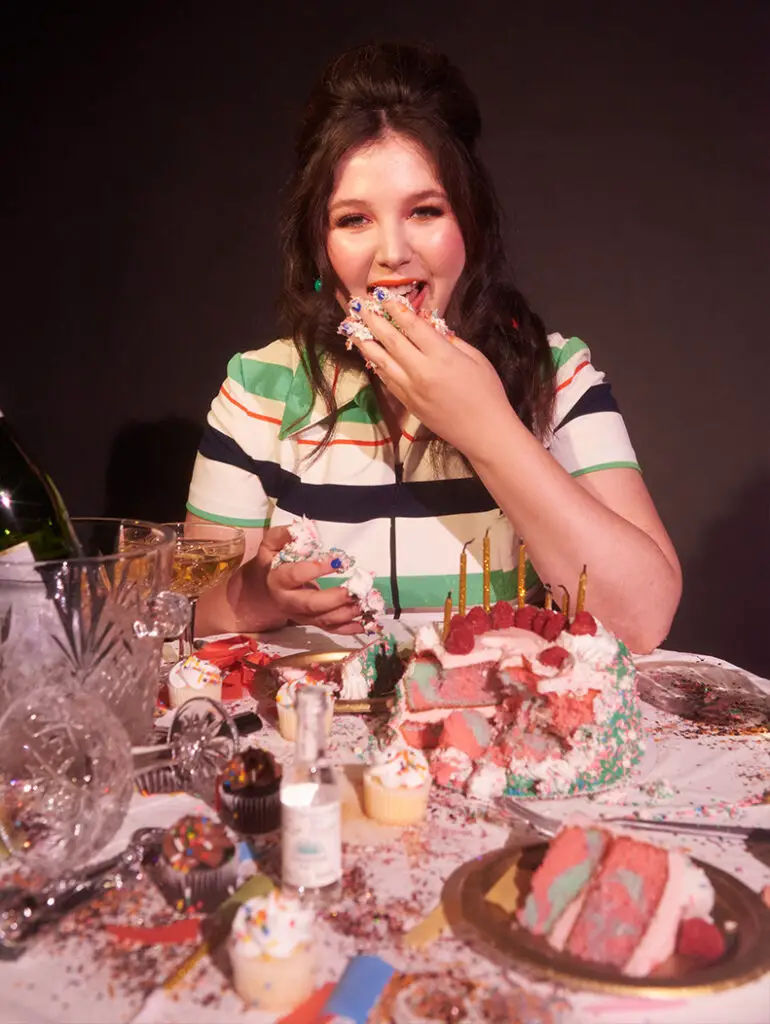
‘Home Video’ is as much about friendship as it is about romantic love. Just as Dacus finds, loses and is cheated out of love on ‘Home Video’, she watches her friends do the same, grappling with their self-worth: “There may be better but you don’t feel worth it / That’s where we disagree.” On ‘Christine’, Dacus is ready to throw her shoe at the altar to object if a close friend marries an undeserving man: “I’d rather lose my dignity than lose you to someone who won’t make you happy.”
“I think that my friends are worth the world. It’s their choice to settle for less and I can’t change their minds but I see it as my job to remind them that they could do better by themselves. It’s not their job to teach someone how to be kind. I want their kindness to be celebrated instead of drained.”
Dacus’ sense of duty shines brightest on ‘Thumbs’ – the first single and darkest moment on the record that debuted as a VHS tape sent to a select few fans. She’s there for a friend when they visit their abusive father but can barely contain her own blind rage – “I love your eyes / and he has them” so Dacus imagines her thumbs on his irises “pressing in / until they burst”. The process of revisiting all that anger felt “physically bad as an emotion” but she also considered it “good to be connected to an aspect of the human experience and to be able to understand violence a little more.”
For much of her youth, Dacus was a pacifist, a stance she considers a privileged one in many ways – it’s easy to reject all forms of violence when you’re rarely in a position that calls for it – that was also shaped by her womanhood, having never been taught to embrace anger. “I don’t feel like female anger is taken seriously or it is taken so seriously that it is disempowered all the time. Whether it’s overt or not, it makes sense that women would be mad. For many reasons, it would be totally justified. So if men feel threatened, they know it might be for a good reason. Particularly in ‘Thumbs’, that man probably knew that he deserved his comeuppance and rage against him. I’m just thankful to my friend for inviting me into her life in that way.”

‘Thumbs’ has had a regular spot in her live shows for years but she knows what it’s like to excavate those raw emotions on stage. “In the past, I’ve been really aware of how, if I share a song, I’ll have to sing it for the rest of my life and stand by it. So it’s kept me from going too dark or dwelling on anything. I remember when I got into Mitski, I was like, ‘How does she sing these songs every night? How does she maintain this amount of rage, revisiting it and keeping it alive?’ The same for some of Julien’s songs, the ones that are more self deprecating: ‘how does she repeat these things to herself every night?’ There are some songs that will be harder to play from ‘Home Video’, but I feel like it’s worth it.”
“I do believe that a song has its own life beyond me. So once it’s out, I think my ideal is that the songs would be taking up space in people’s hearts longer than myself. I hope that the songs matter more than I matter, you know.”
On ‘Night Shift’, Dacus has one request: “in five years, I hope these songs feel like covers / dedicated to new lovers.” Memories rewritten over and over and over again but still not any less real. It’s that “gradual undoing” Dacus spoke of. The VHS tape unspools in the player, ribbons and ribbons of memories and growing pains on the cutting room floor. They reveal who she was always meant to be.
‘Home Video’ by Lucy Dacus is out on June 25 2021
Like what we do? Support The Forty-Five’s original editorial with a monthly Patreon subscription. It gets you early access to our Cover Story and lots of other goodies – and crucially, helps fund our writers and photographers.
Become a Patron!

